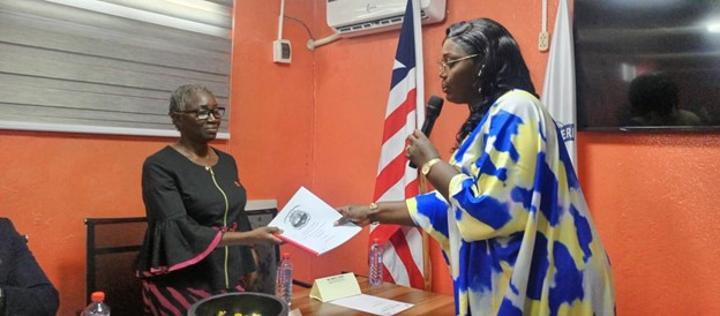Africa-Press – Liberia. During her acceptance speech over the weekend at National AIDS Commission’s head office, Dr. Cecelia J. Nuta said she was aware of the numerous challenges being faced by the National HIV response and the commission.
She expressed her commitment to building upon the gains made by her predecessor, vowing to further improve the entity to coordinate and manage the national HIV response in Liberia.
“I’m committed to building upon the gains, for I along with the four commissioners will move the commission in the direction that we will see it take it’s rightful place as a sole government entity responsible to coordinate and manage the national HIV response in Liberia.”
Continuing, she said: “Ladies and gentlemen, Liberia is a part of the global village and has been working toward the triple 95 target goals set by UN AIDS. This target projects that by 2030, 95% of the people living with HIV and AIDS should have their HIV status. 95% of those who have known their HIV status should be on treatment and 95% of those on treatment should have suppressed virus low. Today, Liberia has achieved 77%, 94%, and 84% respectively.”
Dr. Nuta emphasized that despite of these gains, which are constantly under threat from the inadequate financial support, stigma, and discrimination, Liberia still has a long way to go before it can end AIDS as a public health threat before 2030.
“There is a need for the commission to regularly monitor quality of HIV care and prevention services by service providers. Poor data quality at all level of health care is also a challenge. There is low human capacity to collect and to analyze data. This is largely dividend to the fact that most of those collecting data at the county levels are volunteers,” she lamented,” she said.
According to her, there is no bigger threat to end the epidemic in Liberia than stigma and discrimination.
She stressed that HIV and AIDS related stigma and discrimination rate high in Liberia with a recent study showing 51% of more people reporting discriminatory attitudes toward people living with HIV and volunorable populations.
She maintained that Liberia HIV response must be viewed from the public health perspectives. Dr. Nuta said, Liberia’s response to the AIDS epidemic should not be selective because we’re all at risk of HIV and it infections, as such, the response should cover all persons living within Liberia by embracing diversities.
She disclosed that the National AIDS Commission has a huge task, including mobilizing all stakeholders to ensure that the response remains robust and functional.
“The lack of proper coordination of the HIV response at various levels governmental and nongovernmental, allocating fundings for the implementation of the mandate of the commission, the Commission lacks financial and logistical support and the budget allocated to the commission is inadequate and cannot cover the expensive of the work expected of the Commission,” she said.
Dr. Nuta stated that it would seem that the highly trained and experienced personnel will not attain unto their responsibilities designated to them due to poor financial support.
“We, therefore, urged the government to provide other financial support for the commission. Lack of provision for functioning vehicle for the commissioners and staffs for visitations to the counties and outpost is also another challenge. Provision of basic too, such as, computers are lacking. Collaborating with various organizations to support the commission. Currently, there is no agreement Memorandum of Understanding between most of the organizations. So these are all challenges,” she said.
However, she said regardless of these numerous challenges being faced, it is the responsibilities of the national government to support the work of her institution.
The National AIDS Commission was founded based on the United Nations Three (3) ones Principle which called on all countries to have One Coordinating Body, (NAC) One Strategic Plan (NSP) and Monitoring and Evaluation Framework. The Commission was created as an autonomous agency of government responsible to coordinate and manage the decentralized multi-sector HIV and AIDS response of Liberia.
NAC is headed by a Board of Directors which is chaired by the President of the Republic of Liberia and co-chaired by the Minister of Health. It composed of five (5) which includes a Chair and a Vice Chairperson appointed by the president with the consent of the Liberian Senate.
There are four (4) mandates of the Commission namely: Program and Policy, Partnership, Decentralization and Strategic Information Management. Each mandate is headed by a Commissioner.
NAC currently has five Commissioners including the Chairperson, Dr. Cecelia J. Nuta, Dr. Mohammed Sawaru, Commissioner for Program and Policy/ Vice Chair, J. Alexander Zogbaye, Commissioner for Decentralization, Rev. Patrick Noah, Commissioner for M&E, and Tracy Newon Pency-Kyne, Commissioner for Partnership respectively.
At the close of each year, the commission by law, is required to submit a report to the National Legislature and the office of the president.
“If there are insufficient fundings, these responsibilities will not be carried out. There should be an engagement of the office of the president and other members of the board of Directors in order to regularly update them on the happenings at the commission. There should be providing a space for HIV such that the stigma and discrimination is not a barrier to services or service delivery. This may be possible by first drafting a national policy on stigma and discrimination. Working with sectors to lead it and implement zero discrimination action plan.
There should be strenengthing and coordination and oversight by resuming quarterly review meetings, reactivating the organitional structure such as the county steering committee, technical working groups, and ensure that the commission maintain full control over coordination of the national HIV response. There should be provision of information.
Continuing, “We will work to develop a media and publicity arm of the commission to regularly engage and keep the general public updated and inform them on the danger of HIV infections. We want to build and empower a stronger network of organization of affected communities of people living with HIV and key population that will lead to interventions.
We want to create and strength partnership, particularly the private sector and ensure their participation in the national discourse. We want to ensure also that the commission regularly monitor both programs and financial performances of all implementing partners in counties where active work is ongoing,” Dr. Nuta added.
For More News And Analysis About Liberia Follow Africa-Press






